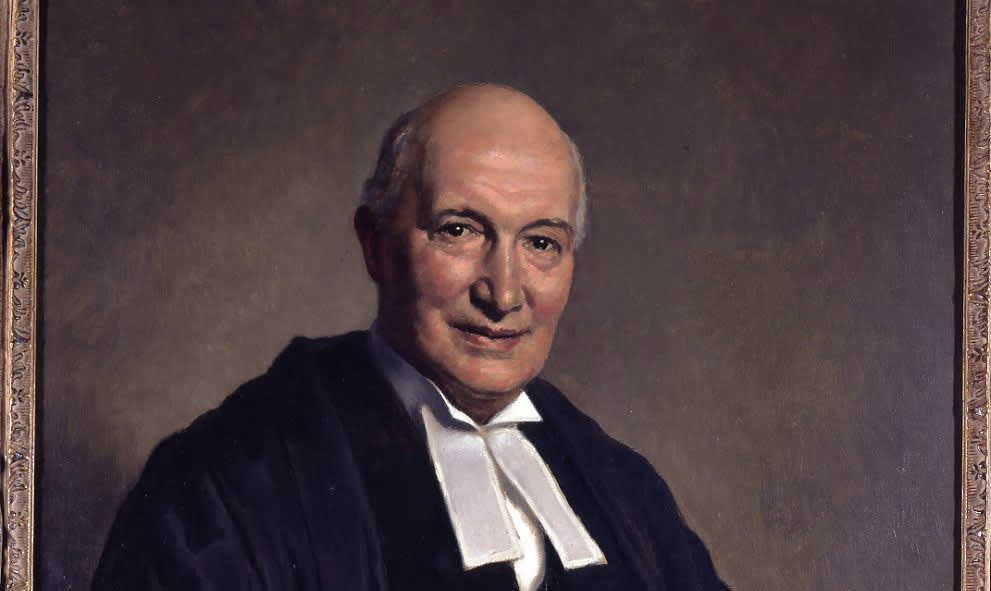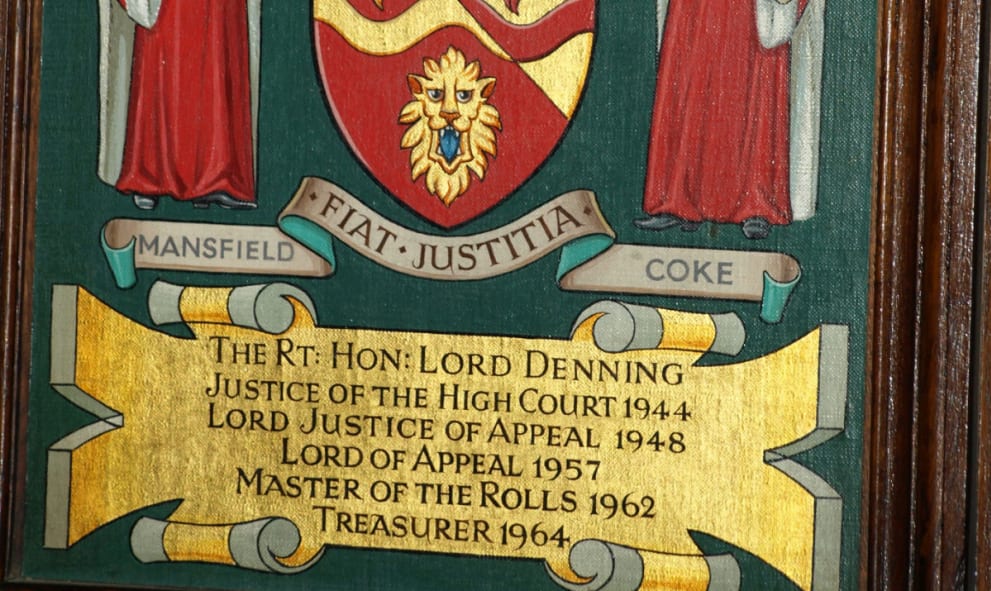March 2019 – A judge of the people and a judge for the people

This month sees the twentieth anniversary of the death of a judge whom many consider to have been the greatest judicial mind of the last century, Alfred Thompson Denning, Baron Denning. Baroness Thatcher said at the time that he “was probably the greatest English judge of modern time. He combined a love of liberty with a passion for justice. His life and work will provide inspiration for generations to come”. Another member of the Inn and former Prime Minister, Tony Blair, who appeared before Denning as a young barrister, said “He was always the soul of courtesy, helping out young barristers or someone with a hopeless case – and sometimes I was both”.
Denning started his long association with Lincoln’s Inn on 4 November 1921 when he was admitted as a student member. He chose this Inn as the Under Treasurer (the Inn’s administrator) at the time was a Magdalen, Oxford, graduate just as Denning was. He was as outstanding as a bar student as he had been at university and came top in the 1923 Trinity term bar exams. He was called to the bar on 13 June 1923 and took up a tenancy in a set of commercial chambers at 4 Brick Court, Middle Temple, where he had done his pupillage. As The Times stated, “Denning did not set out to become a passion-tearing rhetorician, a spellbinding orator or a pitiless cross-examiner” but rather made the intricacies of the common law his life-long passion. He gradually built up a solid, wide ranging practice and took silk in 1938.
Then in 1944 Denning became a High Court judge which led to him being made a Bencher of Lincoln’s Inn. He climbed the judicial ladder with relative speed becoming a Justice in the Appeal Court in 1948 and then moving up to the House of Lords in 1957. This promotion is hinted at in one of the Inn’s group paintings. A picture by Norman Hepple was commissioned in 1957 to commemorate the fact that six out of the nine Appeal Court judges were Lincoln’s Inn members, including Denning. While the painting was still in progress, however, Denning was promoted and his place in the Court of Appeal taken by yet another Lincoln’s Inn man, Sir Benjamin Ormerod. Hepple therefore painted Denning standing, surveying the room as he is about to leave it.
Edward Halliday’s painting, which now hangs next to the library entrance, depicts Denning not in judicial robes but in his ordinary court dress. He sits relaxed with his elbows on the arms of the chair, his hands on his thighs holding his wig. He looks out at you with an open gaze and slight smile as if he is about to ask you a question or enter into some sort of conversation with you. He is the approachable face of the law.

When “the case cried out for new law Denning dared to make it”. This outspoken openness about everything led to controversy throughout his judicial life and some of his views became out of step with changing social attitudes. Finally, in 1982, this brought his career to an end. He overstepped the mark just once too often when, in his book, What’s next in the law, comments relating to black jurors caused offence and led to a lot of adverse press comment. Although Denning apologised and claimed he had not intended what he said to be taken as racist, the damage had been done. Despite the book being withdrawn (to be reissued with the offending passages removed) and support from ethnic minority leaders, he felt obliged to resign and retired that summer.
In 1960 Council ordered that his arms were to be displayed on the wall of the Great Hall along with other distinguished members. (They can also be seen in the chapel in the south window with other Lincoln’s Inn Treasurers.) He chose to have two of the country’s greatest jurists as supporters: Lord Mansfield (1705-1793) on the right and Sir Edward Coke (1552-1634) on the left. His motto ‘Let justice be done’ (fiat justitia) was an echo of his life’s aim. According to Iris Freeman, his biographer, “only posterity will be certain whether Denning stands – as he would like – beside Lord Mansfield, the great 18th-century judicial law-maker. In many ways the two men are comparable. Each found the law in a straitjacket and sought to free it from pedantry, technicalities and narrow-mindedness. Each spoke eloquently of justice and equity. Each liked to generalise the principles of the law and to state them for the guidance of the future. Each left the law less rigid than he found it”.

Denning ended his long association with Lincoln’s Inn when on 5 March 1999 he died a few weeks after his one hundredth birthday. This was not a bad innings at all for someone born prematurely and not expected to survive. Here his memory will live on in the form of the Denning scholarships, founded in 1982 and funded by money subscribed in his honour on his retirement. The Society also has the Denning Society, whose foundation was inspired by Lord Denning shortly before his death with its membership, at his request, restricted to Lincoln’s Inn scholars and bursary holders.
Perhaps, the final words should be those of Lord Denning himself, speaking as a ninety-one year old, “People say I am eccentric and frail. Well, I may be frail in body and hearing, but I hope my state of mind is as alert as ever it was and I am going to speak my mind as freely as I have ever done. I am a common man and I speak for the common people of England and, from the letters I receive, the great majority agree with me”.
